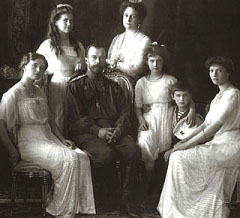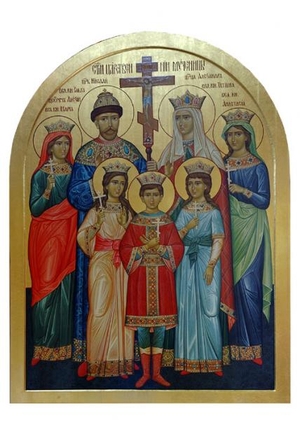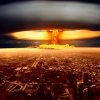Source: Orthodox England
A Talk given after the Divine Liturgy
The Holy Royal Martyrs
4/17 July 2005
 This very day, eighty-seven years ago, the Russian Royal Family and their servants met martyrs’ deaths. If the world is still here in 2018, perhaps all of us seated around these tables will be alive for the centenary of their martyrdom. As I look around, I see Romanian, English, Ukrainian, French, Bulgarian, Russian and one normally resident in Moscow among us. Although only a minority of us is Russian and the vast majority of us are under fifty, since we are all Orthodox, we have all been profoundly affected by the martyrdom of 4 July 1918.
This very day, eighty-seven years ago, the Russian Royal Family and their servants met martyrs’ deaths. If the world is still here in 2018, perhaps all of us seated around these tables will be alive for the centenary of their martyrdom. As I look around, I see Romanian, English, Ukrainian, French, Bulgarian, Russian and one normally resident in Moscow among us. Although only a minority of us is Russian and the vast majority of us are under fifty, since we are all Orthodox, we have all been profoundly affected by the martyrdom of 4 July 1918.
We have come a long way since the glorification of the New Martyrs and Confessors by our part of the Russian Church, nearly twenty-five years ago. At that time this mystical act was mocked by the rest of the world (including certain supposed Orthodox) as some political act to be scorned and condemned. Today in Russia, icons of the Royal Martyrs are commonplace, the faithful name their children after the members of the Imperial Family, churches are dedicated to them, the site of their martyrdom has become a place of pilgrimage, and Orthodox radio and television stations preach on the significance of these tragic events.
There are historians who consider that the martyred Tsar was a poor ruler; others consider him to have been one of the best of rulers. I do not wish to talk about this; my business is not politics, although I do know that Tsar Nicholas II was much slandered. Let us leave politics to academics. The last Russian Tsar and his family are not holy confessors, but holy martyrs. In other words, all the human errors and sins they committed in their lives (and Only One is without sin, Christ our God) were washed away by the blood of martyrdom. Moreover, in case some should confuse politics with the Orthodox Faith, in human, legal and political terms, the New-Martyr Nicholas was not the Tsar of Russia at the time of his martyrdom: he had abdicated over a year before this, in the noble, if mistaken, hope of avoiding bloodshed. Of course, spiritually and mystically, Nicholas was still Tsar, for he had been anointed Emperor, receiving the sacrament of God’s Anointed.

Let us avoid politics and keep to facts:
We know that Tsar Nicholas and his family were very pious. He was probably the most pious of all the Russian Emperors since the seventeenth century. Certainly it was he who ordered the glorification of St Seraphim of Sarov and several other saints, despite the opposition of even some bishops.
We know that he loved peace. Hence his moves in 1898-1899 to convene the Hague Peace Conference in Holland, establishing conventions whereby nations which were in dispute could negotiate, avoiding bloodshed. This Conference was at the root of the League of Nations and later the United Nations.
Finally, we know that when the Austrians, pushed by Berlin, which was very anxious to conquer France according to long-held plans, finally began World War I, Tsar Nicholas’ motives in responding were noble. First of all, he sought to protect the Serbs, the Galicians and the Carpatho-Russsians from Austro-Hungarian persecution. Secondly, he sought to push the Turks out of the territory that they occupied, and still occupy, in Eastern Europe and in the Holy Land. The aims of the Crimean War, which had, ironically, been frustrated sixty years before by the new Russian Allies, the British and the French, would now be realized. Thus, after over 450 years, Russia would at last free Constantinople and the Greeks of Asia Minor, allowing the restoration of the East Roman Empire and also freeing Jerusalem. Finally, Tsar Nicholas hoped to relieve the Armenians from Turkish oppression, opening up the Middle East for its Christian peoples.
None of this happened and, as we know, Russia fell. Russian military reverses began only a few months after the war had broken out in August 1914. The first Non-Russian victims were the Armenians, one million of whom were massacred in the terrible Turkish genocide in 1915, which broke out exactly ninety years ago. However, all the nations who conspired in bringing about the Russian Revolution, directly or indirectly, then suffered.
The Austro-Hungarians lost their Empire. The Habsburgs, the terrible oppressors of Orthodox, were deposed. The final Austrian humiliation was to be invaded by Nazi Germany – becoming through the Anschluss a German colony, ironically, under the leadership of an insane Austrian called Hitler. As regards Hungary, it was to become a small and impoverished nation-state, with a much reduced territory.
The Germany of Kaiser Wilhelm, humiliated and deposed, disappeared into anarchy and humiliation. World War II was born directly out of the debacle of Germany, bringing yet another terrible punishment on the German people.
The Jews, who formed the core of the Bolsheviks and who had largely financed the Russian Revolution from New York, suffered most. Not only were the Jewish Bolsheviks to be massacred by Stalin, but at least one million Jews who had once lived relatively well in Tsarist Russia (ever since, centuries earlier, they had taken refuge there after being expelled from anti-Semitic Western Europe) were massacred by Hitler.
By 1917, the Allies of Russia, France and Great Britain, who had at first disloyally welcomed the Revolution, and for whom so many Russian soldiers had died, were faced with defeat by Kaiser Wilhelm’s reinvigorated Germany. Great Britain had gone bankrupt and was forced into signing the Balfour Declaration, in order to borrow money from Jewish financiers to continue the war against a Germany now fighting on only one front. The Balfour Declaration was to establish the State of Israel and begin the Middle East problem, the huge grudge of dispossessed Palestinians, unleashing Islamic fundamentalism, which to this day haunts the world, especially at this very moment London.
Even the Balfour Declaration was not to be enough. France and Great Britain and their colonial Empires were so exhausted by World War I, that they were obliged to call on the USA to save them. It was the end of European world domination, the beginning of the end of European colonial Empires, and the beginning of a world dominated by the USA. Indeed, a generation later, the same USA had to be called on by Western Europe yet again, in order to save it from its latest bout of insanity: World War II.
The USA, keen to see American-style democracy in Russia, therefore encouraged the Revolution. It soon regretted it, having created for itself the Soviet enemy. Thus, there later began a Cold War lasting some forty-five years, during which the world cowered from the threat of nuclear holocaust.
As for other non-Russian inhabitants of Imperial Russia, at first many, like the Ukrainians or the Latvians, welcomed the Revolution, but these small minority peoples were soon to regret it. The Latvians suffered, first from Hitler and then from Stalin. Ukraine was depopulated by the terrible artificial famine of Stalin, in which 20th century Europeans were reduced to cannibalism. However, few suffered as much as the Poles. Having re-established Poland, they began oppressing the minority peoples in the new Poland, having learnt nothing from their own sufferings. Notably, after the Russian Revolution, the Polish State dynamited some 400 Orthodox churches before their own nemesis came, in 1939, in the shape of Hitler from the west and Stalin from the east. For the Poles, World War II was to end as it had begun, occupied and ravaged by a murderous dictator.
As regards the liberals and freemasons who had fomented the Revolution of March 1917 and forced the Tsar to abdicate, they too were punished. By November 1917 they were being forced into exile. Great sections of the Orthodoxy-hating aristocracy and liberal intelligentsia, often with German names, went into exile, mainly in Paris, where their only comfort was the freemasons’ lodges they founded there.
The list of sufferings caused around the world could continue and we could speak of the Communist genocide in China, Vietnam, Cambodia, Cuba, Africa and among all the other naive victims of the Communist delusion around the world. The point is, however, that whatever the faults of Tsarist Russia, and there were many, they were as nothing when compared to the faults that were to follow under the satanic and suicidal regimes of Lenin and Stalin and their followers. From this we can, at least, learn never to destroy something, if we do not first have something better to put in its place.
Recently, seeing the greatly humbled position of modern Russia on the world stage, President Putin has suggested that the greatest catastrophe in the recent history of Russia was the fall of the Soviet Union. Had he extended his time-scale, then surely he would have said that the greatest catastrophe ever in Russian history was the overthrow of Imperial Russia, which made the horrors and tragedies of the Russian Revolution and the Soviet Union and World War II, and then the fall of the Soviet Union, inevitable.
Some 75 years ago the greatest twentieth-century hierarch of the Russian Church, Metropolitan Antony of Kiev, wrote that the roots of the fall of Russia, which he had foretold on several occasions before 1917, went back to 1666. It was then that the holy Russian Patriarch Nikon had been deposed and had already foretold the collapse of Russia as an Orthodox land. After this, there had inevitably followed the complete abolition of the Russian Patriarchate by Peter I in 1721, and in 1797 the proclamation of the Emperor as the head of the Russian Church under Paul I. The Church had become a mere department of State, as in the Protestant model – as indeed in the Soviet model. Quoting Genesis 6,3, which foretold the Flood, And the Lord said, My spirit shall not always strive with man, for that he also is flesh: yet his days shall be an hundred and twenty years, Metropolitan Antony wrote of how 1917 was exactly 120 years after 1797. Thus, 120 years after 1797, there began the all-destructive Flood of 1917. (See the Biography of Metropolitan Antony, Vol III, pp 6-9, Bishop Nikon (Rklitsky), New York 1957).
The tragedy of the Russian Royal Family was that they were to die, not for their own human sins, but for the sins of their dynasty and all Russia. They were in fact prisoners of a system, a system into which they were born, a system whereby the whole of the Russian Empire was governed not by Church and State, but by the State and a decapitated Church. With the spiritual principle of the Church subverted, the Russian State was unbalanced and, sooner or later, the Revolution had to happen. The State needed the Church, just as the Church needed the State.
Having worked all his life for the restoration of Church Independence and the Patriarchate in Russia, in 1928 Metropolitan Antony also wrote: ‘The two-hundred years of the slavery of the episcopate and the priests has humiliated their will-power and determination to such an extent that the support of the State is vital to them, so that the Church does not turn into a smallish sect of voluntary martyrs amid a huge mass of traitors, fraudsters, money-grubbers, flatterers and slanderers’ (Op. cit. p. 14). In other words Metropolitan Antony knew exactly what would happen to the Russian Church under a Bolshevik regime. Its final humiliation under Communism had been perfectly rehearsed since the abolition of the Patriarchate in 1721.
In today’s Russia, Communism no longer exists, officially. Of course, we know that it does exist in mentalities. In today’s Russia, the putrefying corpse of Lenin still lies in Red Square, organized crime and violence are widespread and two million abortions occur every year. However, those nostalgic and negative йmigrйs, still living in the Cold War past, believing that Russia has not changed at all in the last fifteen years, and demanding that Russia return to what it was before 1917, are wrong on both counts.
First of all, they are wrong because great changes have taken place in Russia in the last fifteen years. 20,00 churches and 600 monasteries have opened. Here in the West, the only thing that is talked about in religious circles, is the closure of churches and monasteries. And here I am not only talking about Non-Orthodox. I have seen countless parishes of our Church die out and close, both in England and in France, as Russians are assimilated and refuse to do missionary work. For example, our church in London only exists today because of the presence of new Russian immigrants. During the period of stagnation (‘zastoi’) in Soviet Russia in the 1970s, Solzhenitsyn said that when you are at the bottom, there is only one way to go – upwards. Today, Russia is going upwards, perhaps slowly, perhaps with great difficulty, but nobody ever said that repentance was easy.
Secondly, such nostalgic and negative emigres are wrong in wanting to return to pre-1917 Russia (which is impossible anyway), because if ever Russia is restored, it should not return to the errors of before 1917. And the main error was that its administrators, those who so often did not so much carry out the wishes of the Russian rulers, as prevent them from being carried out, confused two things. They confused the narrow and provincial, political interests of Russian nationalism with the calling of Orthodox Russia. And the calling of Orthodox Russia, as figures like Patriarch Nikon, Metropolitan Antony of Kiev and the writer Dostoyevsky knew, is to protect and defend the Universal Orthodox Commonwealth, the Union of Oppressed Orthodox Peoples. Oppressed perhaps only for a few decades or centuries, or oppressed perhaps, like us here in England, for nearly a thousand years. The Russia of before 1917 was to a certain extent not Orthodox at all. That, after all, is why the Revolution happened.
The Orthodox calling of Russia is what the noblest souls in Russia knew about before the Revolution. It is what the Tsar knew, once the Austrians had started the war in 1914. It is what pious Russian peasants knew when they went on pilgrimage to Jerusalem, it is what the Russian-supported Patriarch of Antioch knew, it is what the great Patriarch Joachim III of Constantinople knew, it is what Orthodox Bulgaria knew, it is what Orthodox Carpatho-Russians in Czechoslovakia knew when they gave shelter to Russian refugees after 1917, it is what the Serbs knew when they began venerating the martyred Tsar as early as the 1930s. But the Westernized Russians, the apostatic aristocrats, the professors, the growing middle-class – they did not know it, and so brought on their heads their own misfortune and the misfortune, not only of all Russia, but of all Orthodox lands and peoples.
Without the support of a benign Orthodox Emperor, since 1917 the Russian Church has experienced Golgotha, as have the Georgian and Serbian Churches. Without the support of a benign Orthodox Emperor, since 1917 all the other Orthodox Churches, in Eastern Europe, in the Balkans, in Constantinople and in the Middle East have been the victims of either Communist, Fascist, Muslim or else Masonic political regimes. And Orthodox minorities in Western countries, like ourselves, have suffered and suffer because we have no support, we sit and weep in our little churches as small minorities, by the rivers of Babylon.
Let no-one say that the events of 1917 and the martyrdom of the Russian Royal Family in 1918 only concern Russians; they concern all who are Orthodox. Some twenty-five years ago, I remember a Russian friend visiting Moldavia in Romania. There she spoke to an old peasant-woman. On telling her that she was Russian but now lived in England because of the Revolution, the old woman crossed herself and said: ‘Ah, it was when they killed the Orthodox Tsar in Russia that all our troubles in Romania began’. Russian Destinies? World Destinies.
You might also like:
The Holy Royal Martyrs in the Light of History and God’s Providence
















